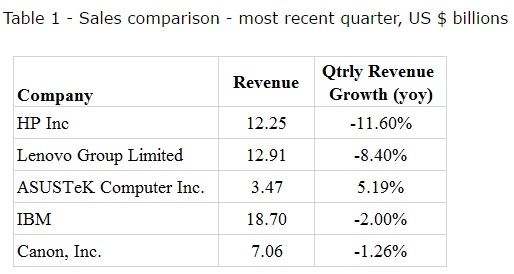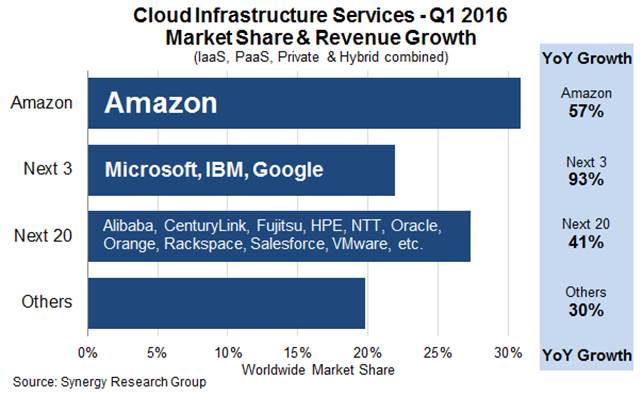
The tables have turned for Oracle. A month ago they were suing Google for $8.8B dollars and now they are being sued by HPE for failure to comply with a contractual support commitment AND for potentially cooking their books in the cloud space.
SalesForce and IBM both announced that they are purchasing companies this week. But are these companies taking on too much debt? SaleForce is already being called out for paying too much for DemandWare ($2.8B), but is cheap credit causing a bigger issue in the tech-world?
IBM
- IBM to Buy EZSource to Help Developers Modernize Mainframe Apps
Big Blue announced on June 1 its intent to acquire EZ Legacy (EZSource), an Israel-based application discovery company, to help developers easily understand and change mainframe code based on data displayed on a dashboard and other visualizations. The acquisition is expected to close in the second quarter of 2016. Financial terms of the deal were not released.
http://www.eweek.com/developer/ibm-to-buy-ezsource-to-help-developers-modernize-mainframe-apps.html
- IBM’s Rometty: Watson financials don’t need to be broken out
“If it’s digital, it will be cognitive,” Rometty said. She said there’s no value in disclosing Watson financials while “I nurture and grow it.”
http://www.cnbc.com/2016/06/01/ibms-rometty-watson-financials-dont-need-to-be-broken-out.html
- IBM Watson invading Cisco routers for IoT takeover at the edge
Another example given was for remote workers to be able to better monitor and manage the health of equipment, like machinery. Even at the edge, the equipment can be monitored in real-time and users will know when maintenance will be needed.
http://www.techrepublic.com/article/ibm-watson-invading-cisco-routers-for-iot-takeover-at-the-edge/
Microsoft
- Microsoft and Facebook to build subsea cable across Atlantic
MAREA will be the highest-capacity subsea cable to ever cross the Atlantic – featuring eight fiber pairs and an initial estimated design capacity of 160Tbps. The new 6,600 km submarine cable system, to be operated and managed by Telxius, will also be the first to connect the United States to southern Europe: from Virginia Beach, Virginia to Bilbao, Spain and then beyond to network hubs in Europe, Africa, the Middle East and Asia. This route is south of existing transatlantic cable systems that primarily land in the New York/New Jersey region. Being physically separate from these other cables helps ensure more resilient and reliable connections for our customers in the United States, Europe, and beyond.
- Microsoft faces blowback in China over unwanted Windows 10 upgrades
Posts critical of Microsoft on microblog site Weibo relating to the Windows 10 upgrade, which Microsoft users must switch to, have grown to over 1.2 million in number, it said. “The company has abused its dominant market position and broken the market order for fair play,” Xinhua quoted Zhao Zhanling, a legal adviser with the Internet Society of China, as saying. He said users or consumer protection organizations had the right to file lawsuits against the company as Microsoft had not respected users’ right to know and choose, and may eventually profit from the unwanted upgrades.
- Microsoft just BANNED all your terrible passwords (there were hundreds of articles about this)
The US technology firm has created a dynamically-updated list of terrible passwords, which it will not let you use when registering for an account online.
Rather than provide some loose guidelines about password length and complexity, the Redmond firm will not let you use any of the commonly used passwords.
The list of offenders will be continually updated based on new leaks, so when people start to shift to other easy-to-guess passwords – these will also be banned.
Hewlett Packard Enterprise | HP Inc
- What Will HPE Sell Next?
I’d say the smart money was on servers. When IBM sold off PCs, it couldn’t sustain its Intel-based server business and had to sell it to Lenovo — the firm that bought the PC business. So I guess HPE could try to sell servers to HP Inc., but HP Inc. is up to its eyeballs in debt already, thanks to being gifted with all of the company debt in the divestiture, so I doubt it has the resources to buy it.
Next in line would be Oracle, because Mark Hurd knows the business and it would strengthen Oracle’s offering. However, Hurd also knows what it is worth, and I’ll bet it is less than Whitman is willing to accept.
This is interesting:
Maybe this should be titled “Death by CEO.” If you don’t buy it, just take a look at HP Inc.’s executive team.
You’ll see two people who likely have the strongest inside knowledge of Meg Whitman’s plan: HP’s old CFO Cathie Lesjak, who is rather famous for either stopping or trying to stop some of HP’s biggest mistakes; and HP’s old head of HR, Tracy Keogh, who is out of Harvard and arguably the most qualified HR director in tech. Both of them left HPE, and probably not because they thought Whitman was a brilliant CEO. Just saying.
- Is There More Upside for Computer Sciences?
HP Enterprise (ticker: HPE) gets to unload its slowly shrinking business of managing computer networks and focus on its growing business of selling networking hardware and software, along with specialized services. Computer Sciences (CSC) gets something big to squeeze costs out of. It has plenty of recent experience. Barron’s recommended shares of Computer Sciences nearly three years ago based on new chief Mike Lawrie’s work letting go of money-losing contracts and consolidating scattered departments to bring down costs (“Jockeying for Position in the Cloud,” Sept. 14, 2013). Shares have more than doubled since then, factoring in the spinoff of a government-services unit last year and dividends, including a $10.50 a share special.
http://www.barrons.com/articles/is-there-more-upside-for-computer-sciences-1464409150
- HP Enterprise takes Oracle to court, demands $3B
In spite of the Itanium’s reputation, a 2010 settlement agreement between HP and Oracle obligated Oracle to offer its products on HP’s Itanium-based server platforms until HP discontinued them. Yet not long after that, Oracle announced it would no longer support the Itanium platform because HP was planning to shut it down eventually.
http://www.zdnet.com/article/hp-enterprise-takes-oracle-to-court-demands-3b/
- HPE hunkers down on data center hardware
What is interesting to us here at The Next Platform is that HPE is focusing down on the most core datacenter products it has, including servers, storage, switches, systems software (including operating systems and a smattering of management tools, databases, and other selected middleware), plus financing for the whole kit and caboodle for those customers who want to use other people’s money to fund their IT infrastructure. The resulting HPE after the spinout of Enterprise Services to CSC is going to be considerably smaller than the HPE that was just separated from the PC and printer business last year – about $33 billion in annual sales – but it is a good guess that this leaner HPE will be a lot more profitable. HPE will also not be going through round after round of restructurings in the services business, which it has endured since buying Compaq in 2001 and which accelerated in the wake of the acquisition of EDS in 2008.
http://www.nextplatform.com/2016/05/27/hpe-hunkers-datacenter-hardware/
Oracle
- Oracle Shares Fall After a Lawsuit Related to Cloud Computing Business
Svetlana Blackburn, in a suit filed Wednesday in federal court in the Northern District of California, alleges her finance job in Oracle’s cloud-computing business “came to an abrupt end because she resisted, refused to engage in and threatened to blow the whistle on accounting practices she reasonably believed to be unlawful.”
Also:
Later on Thursday, Oracle was hit with another suit, this time a class-action case that cites Ms. Blackburn’s litigation and says the stock drop caused “significant losses and damages” to class members.
An Oracle investor, Grover M. Klarfeld, sued on behalf of himself and “all others similarly situated.” His complaint accuses the company of violating federal securities laws by using “improper accounting practices to inflate the company’s cloud-computing revenues by millions of dollars.”
- Oracle Says It Will Sue Former Employee Who Sued It
Because… of course they will!The problem for Oracle, and other large enterprise technology companies, is that no one really believes their cloud sales figures. Reported numbers typically include lots of software and even hardware that most companies would not consider cloud at all, complicating comparisons between growth businesses and legacy businesses.
http://fortune.com/2016/06/02/oracle-employee-lawsuit-cloud-sales/
Other
- Google goes after Microsoft, Tableau, and others with a new free analytics tool
The company has launched Data Studio, a free version of the data visualization tool it introduced as part of an analytics suite it unveiled earlier this year. It includes a wide variety of data connectors to let customers visualize data from Google AdWords, Google Sheets, and other Google products.
It also integrates with BigQuery, and the company plans to launch a connector for SQL databases later this year.
- Apple is working on an AI system that wipes the floor with Google and everyone else
For example, imagine asking a computer to “Find a nearby Chinese restaurant with open parking and Wi-Fi that’s kid-friendly.” That’d trip up most assistants, but VocalIQ could handle it. The result? VocalIQ’s success rate was over 90%, while Google Now, Siri, and Cortana were only successful about 20% of the time, according to one source.
http://www.businessinsider.com/how-apples-vocaliq-ai-works-2016-5?&platform=bi-androidapp
- The Debt Problem Is Bigger Than You Think
There’s two problems here, though. First, debt has been growing faster than cash. For example, over the last year, cash balances rose 1.8% while debt due in the next five years expanded by 17%, according to Bloomberg. S&P pegged those numbers at 1% and 15% for its sample. But the direction is the same, more debt growth than cash growth. This discrepancy can only go on for so long before it becomes a notable problem – if it hasn’t already.
Second, all that new debt isn’t getting put to productive use. Indeed, capital spending has hardly been a bright spot in recent quarters, including the relatively weak first quarter of this year. True, a lot of the cash is being pushed toward stock buybacks, which makes sense in some situations. But certainly not in all situations. Dividend increases are another place some cash has been put to work, which makes a dividend investor like me happy. However for some companies, the cost of a dividend hike might not be worth the risk of the debt.
http://seekingalpha.com/article/3978849-debt-problem-bigger-think
- Salesforce Acquires Demandware for $2.8 Billion
Demandware offers a variety of enterprise services through the cloud, including digital commerce, order management, predictive intelligence and point of sale. Prior to the acquisition, the company had counted several global brands among its clients, including Design Within Reach, Lands’ End, L’Oreal, and Marks & Spencer.
http://www.toptechnews.com/article/index.php?story_id=0010000LHSIA
Also:
Salesforce: Overpaying For DemandwareThe only reason for a firm to pay a premium over the market value for another firm is if the acquiring firm believes there are significant synergies attainable through acquisition. As the deal is constructed, Salesforce is paying a premium of $27.01/share (from 5/31/16 close price), or slightly over $1 billion above market price. Salesforce has yet to make any mention of the dollar value of synergies between the two companies.
http://seekingalpha.com/article/3979432-salesforce-overpaying-demandware
Photo: Tony Webster







